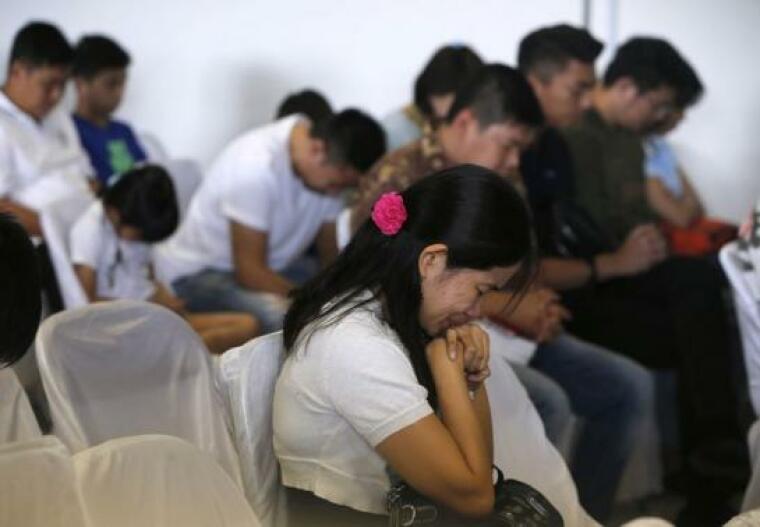AirAsia QZ8501 Search Hampered By Bad Weather and Rough Seas

Search and rescue teams are racing against time and weather to retrieve more bodies from the ill-fated AirAsia QZ8501 plane that crashed Sunday off the coast of Borneo after it lost contact some 40 minutes upon takeoff from Surabaya, Indonesia to Singapore.
Only seven bodies – four men and three women - were recovered so far, as strong waves and rough seas hampered the search. Some of the bodies were fully clothed, indicating that the plane, an Airbus A320-200, was intact when it hit water, and that it might have suffered an aerodynamic stall.
Indonesian President Joko Widodo said the operation would continue and that his government's priority was retrieving more bodies.
"The weather was really challenging in the field, with waves up to five meters high, wind reaching 40 kph, and heavy rains, especially in the search area," Fransiskus Bambang Soelistyo, head of Indonesia's search and rescue agency, said.
Two of the recovered bodies – marked 001 and 002 pending identification – were placed in flower-bedecked coffins and brought by air force plane to Surabaya where victims' relatives held vigil while awaiting for news of their loved ones.
Surabaya authorities prepared to identify bodies, including collecting DNA samples from relatives.
Ships and planes have been scouring the Borneo sea for the missing Airbus since Sunday. Search and rescue operations are concentrated to where the debris has been found -- in the Karimata Strait, about 110 nautical miles southwest of Indonesian city of Pangkalan Bun, AirAsia said.
Rescuers, including international teams, believed they found the plane on the Strait's sea floor, after a sonar scan detected a large, dark object beneath the waters. "We are praying it is the plane so the evacuation can be done quickly," Soelistyo said.
The black box flight data and cockpit voice recorder that could provide clues as to the cause of the air disaster have yet to be found.
Flight QZ8501 was carrying 155 passengers and seven crew members. The majority were Indonesians, while others were citizens of Britain, France, Malaysia, Singapore and South Korea.
 Christians don't have to affirm transgenderism, but they can’t express that view at work: tribunal
Christians don't have to affirm transgenderism, but they can’t express that view at work: tribunal Archaeology discovery: Medieval Christian prayer beads found on Holy Island
Archaeology discovery: Medieval Christian prayer beads found on Holy Island Presbyterian Church in America votes to leave National Association of Evangelicals
Presbyterian Church in America votes to leave National Association of Evangelicals Over 50 killed in 'vile and satanic' attack at Nigerian church on Pentecost Sunday
Over 50 killed in 'vile and satanic' attack at Nigerian church on Pentecost Sunday Ukrainian Orthodox Church severs ties with Moscow over Patriarch Kirill's support for Putin's war
Ukrainian Orthodox Church severs ties with Moscow over Patriarch Kirill's support for Putin's war Islamic State kills 20 Nigerian Christians as revenge for US airstrike
Islamic State kills 20 Nigerian Christians as revenge for US airstrike Man who served 33 years in prison for murder leads inmates to Christ
Man who served 33 years in prison for murder leads inmates to Christ


 Nigerian student beaten to death, body burned over ‘blasphemous’ WhatsApp message
Nigerian student beaten to death, body burned over ‘blasphemous’ WhatsApp message 'A new low': World reacts after Hong Kong arrests 90-year-old Cardinal Joseph Zen
'A new low': World reacts after Hong Kong arrests 90-year-old Cardinal Joseph Zen Iran sentences Christian man to 10 years in prison for hosting house church worship gathering
Iran sentences Christian man to 10 years in prison for hosting house church worship gathering French Guyana: Pastor shot dead, church set on fire after meeting delegation of Evangelicals
French Guyana: Pastor shot dead, church set on fire after meeting delegation of Evangelicals ‘Talking Jesus’ report finds only 6% of UK adults identify as practicing Christians
‘Talking Jesus’ report finds only 6% of UK adults identify as practicing Christians Mission Eurasia ministry center blown up in Ukraine, hundreds of Bibles destroyed: 'God will provide'
Mission Eurasia ministry center blown up in Ukraine, hundreds of Bibles destroyed: 'God will provide' Church holds service for first time after ISIS desecrated it 8 years ago
Church holds service for first time after ISIS desecrated it 8 years ago Burger King apologizes for 'offensive campaign' using Jesus' words at the Last Supper
Burger King apologizes for 'offensive campaign' using Jesus' words at the Last Supper Uganda: Muslims abduct teacher, burn him inside mosque for praying in Christ’s name
Uganda: Muslims abduct teacher, burn him inside mosque for praying in Christ’s name